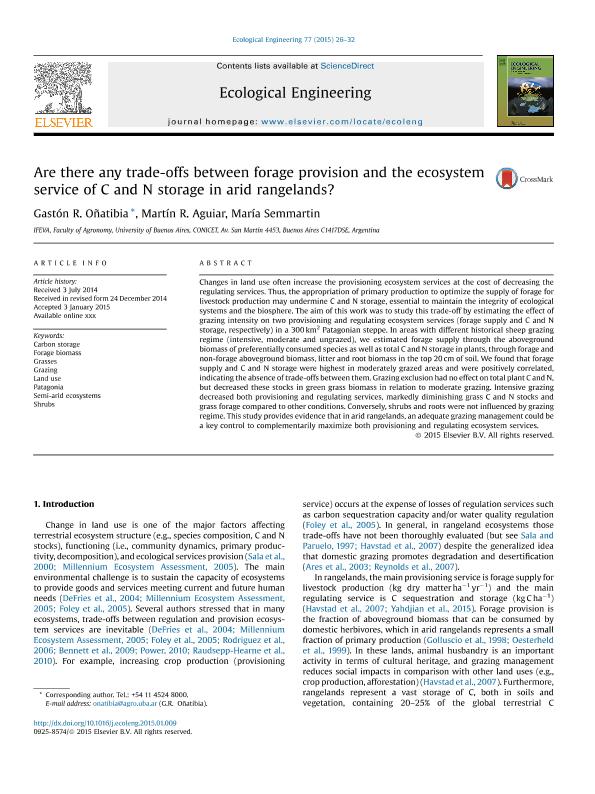Mostrar el registro sencillo del ítem
dc.contributor.author
Oñatibia, Gastón Rafael

dc.contributor.author
Aguiar, Martin Roberto

dc.contributor.author
Semmartin, María Gisela

dc.date.available
2017-06-02T19:04:27Z
dc.date.issued
2015-04
dc.identifier.citation
Oñatibia, Gastón Rafael; Aguiar, Martin Roberto; Semmartin, María Gisela; Are there any trade-offs between forage provision and the ecosystem service of C and N storage in arid rangelands?; Elsevier Science; Ecological Engineering; 77; 4-2015; 26-32
dc.identifier.issn
0925-8574
dc.identifier.uri
http://hdl.handle.net/11336/17392
dc.description.abstract
Changes in land use often increase the provisioning ecosystem services at the cost of decreasing the regulating services. Thus, the appropriation of primary production to optimize the supply of forage for livestock production may undermine C and N storage, essential to maintain the integrity of ecological systems and the biosphere. The aim of this work was to study this trade-off by estimating the effect of grazing intensity on two provisioning and regulating ecosystem services (forage supply and C and N storage, respectively) in a 300 km2 Patagonian steppe. In areas with different historical sheep grazing regime (intensive, moderate and ungrazed), we estimated forage supply through the aboveground biomass of preferentially consumed species as well as total C and N storage in plants, through forage and non-forage aboveground biomass, litter and root biomass in the top 20 cm of soil. We found that forage supply and C and N storage were highest in moderately grazed areas and were positively correlated, indicating the absence of trade-offs between them. Grazing exclusion had no effect on total plant C and N, but decreased these stocks in green grass biomass in relation to moderate grazing. Intensive grazing decreased both provisioning and regulating services, markedly diminishing grass C and N stocks and grass forage compared to other conditions. Conversely, shrubs and roots were not influenced by grazing regime. This study provides evidence that in arid rangelands, an adequate grazing management could be a key control to complementarily maximize both provisioning and regulating ecosystem services.
dc.format
application/pdf
dc.language.iso
eng
dc.publisher
Elsevier Science

dc.rights
info:eu-repo/semantics/openAccess
dc.rights.uri
https://creativecommons.org/licenses/by-nc-nd/2.5/ar/
dc.subject
Patoreo Ovino
dc.subject
Ingeniero Ecosistemico
dc.subject
Forrajeo Optimo
dc.subject
Desertificacion
dc.subject.classification
Conservación de la Biodiversidad

dc.subject.classification
Ciencias Biológicas

dc.subject.classification
CIENCIAS NATURALES Y EXACTAS

dc.title
Are there any trade-offs between forage provision and the ecosystem service of C and N storage in arid rangelands?
dc.type
info:eu-repo/semantics/article
dc.type
info:ar-repo/semantics/artículo
dc.type
info:eu-repo/semantics/publishedVersion
dc.date.updated
2017-06-02T17:31:43Z
dc.journal.volume
77
dc.journal.pagination
26-32
dc.journal.pais
Países Bajos

dc.journal.ciudad
Amsterdam
dc.description.fil
Fil: Oñatibia, Gastón Rafael. Consejo Nacional de Investigaciones Científicas y Técnicas. Oficina de Coordinación Administrativa Parque Centenario. Instituto de Investigaciones Fisiológicas y Ecológicas Vinculadas a la Agricultura. Universidad de Buenos Aires. Facultad de Agronomía. Instituto de Investigaciones Fisiológicas y Ecológicas Vinculadas a la Agricultura; Argentina
dc.description.fil
Fil: Aguiar, Martin Roberto. Consejo Nacional de Investigaciones Científicas y Técnicas. Oficina de Coordinación Administrativa Parque Centenario. Instituto de Investigaciones Fisiológicas y Ecológicas Vinculadas a la Agricultura. Universidad de Buenos Aires. Facultad de Agronomía. Instituto de Investigaciones Fisiológicas y Ecológicas Vinculadas a la Agricultura; Argentina
dc.description.fil
Fil: Semmartin, María Gisela. Consejo Nacional de Investigaciones Científicas y Técnicas. Oficina de Coordinación Administrativa Parque Centenario. Instituto de Investigaciones Fisiológicas y Ecológicas Vinculadas a la Agricultura. Universidad de Buenos Aires. Facultad de Agronomía. Instituto de Investigaciones Fisiológicas y Ecológicas Vinculadas a la Agricultura; Argentina
dc.journal.title
Ecological Engineering

dc.relation.alternativeid
info:eu-repo/semantics/altIdentifier/doi/http://dx.doi.org/10.1016/j.ecoleng.2015.01.009
dc.relation.alternativeid
info:eu-repo/semantics/altIdentifier/url/http://www.sciencedirect.com/science/article/pii/S0925857415000105
Archivos asociados
